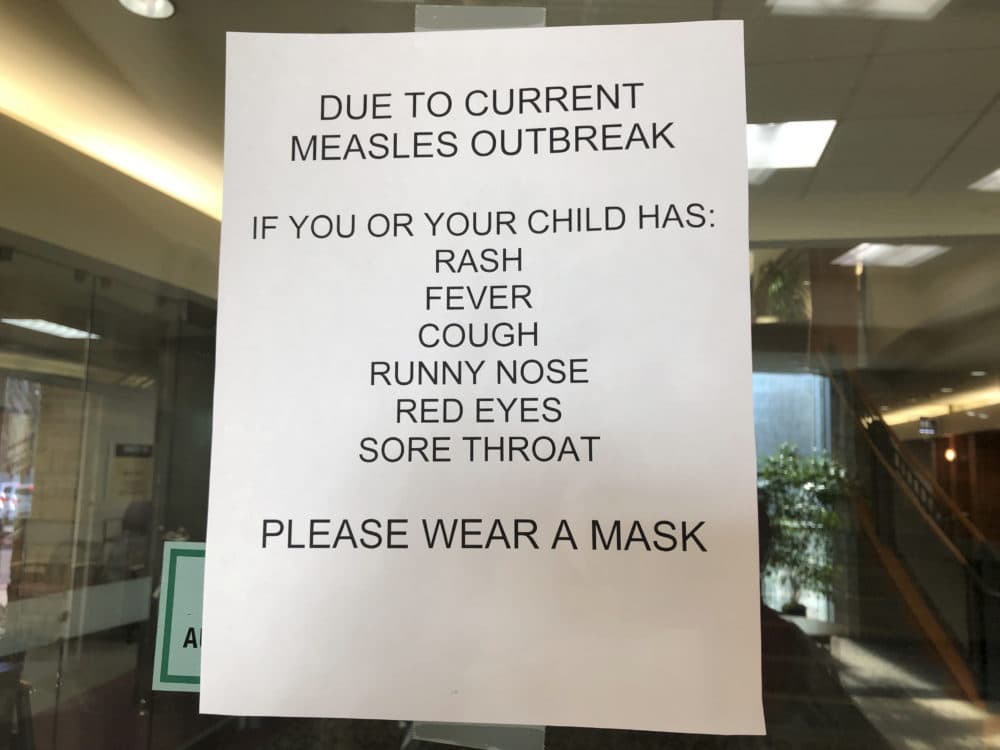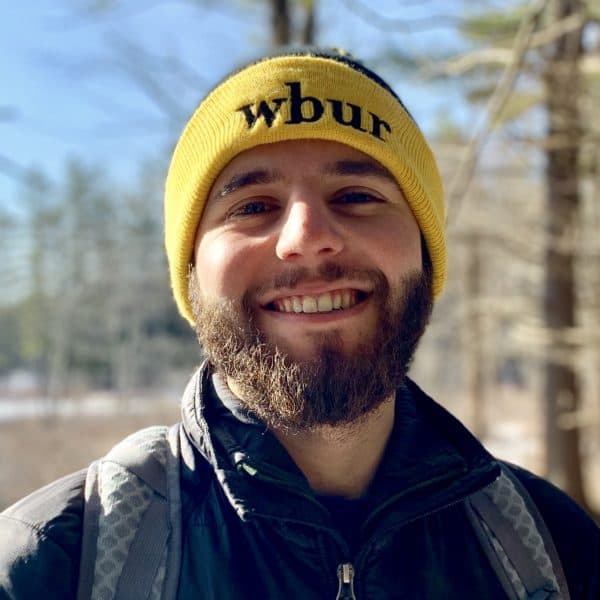Advertisement
Infectious, Part 4: Anatomy Of An Outbreak
Resume
Endless Thread presents a special series, "Infectious: The Strange Past and Surprising Present of Vaccines — and Anti-Vaxxers." This is Part Four. Find Part One here, Part Two here , and Part Three here.
The measles outbreak in Clark County, Washington, right over the border from Oregon, has been a hot topic on Reddit. Take this post from Redditor u/SilentSkeeter:
This post sparked nearly four thousand comments in response. Another popular post, this one on the Legal Advice subreddit, digs into the tension in that area a little deeper:
So, the Endless Thread team decided to travel to the Pacific Northwest to witness this battle over vaccinations playing out first-hand and try to figure out why this was happening there in the first place.
Vaccine Exemptions
The first example of the vaccination battle the Endless Thread team encountered was playing out in Olympia, Washington, the state capitol. State Rep. Paul Harris was at the center of it. He's the leader of the state's Republican Caucus and one of the representatives from Clark County.

Harris introduced House Bill 1638 in mid-January, right as the region’s measles outbreak was reaching a fever pitch. The bill does one thing: take away the philosophical exemption for the measles, mumps, and rubella (MMR) vaccine.
There are three types of exemptions used in the United States for folks who don't want to — or can't — get vaccinated: medical, religious, and philosophical. All 50 states have the medical exemption, most have the religious exemption, but just a handful offer a philosophical exemption.
The philosophical exemption is the easiest of the three to obtain, and it's the reason unvaccinated kids in Washington are allowed into public school. For a politician like Harris trying to slow down the outbreak in his county, this is an important — albeit small — first step.
"My goal is not to cause [anti-vaxxers] problems. But I am concerned when I have the measles appear in my community ... I just want to get my community immunity up," says Harris.
One problem: many people in Clark County specifically, and in the Pacific Northwest generally, are fiercely opposed to government involvement in individual decision-making, especially when it comes to something like vaccination.
Harris has even gotten blowback from his fellow Republicans, not to mention tons of feedback from his constituents. "I'm getting emails from the same people over and over and over and over and over again," he says.
Nevertheless, Washington Gov. Jay Inslee signed House Bill 1638 into law on May 10 — a win for Harris and others in favor of nudging the population into community immunity.
Healthy Immunity
About 85 miles north of Olympia, near Seattle, a different type of gathering was taking place. "Healthy Immunity" is an annual conference hosted by Informed Choice Washington (ICW), a prominent vaccine-hesitant group in the state. But the conference is about more than just vaccination.
"Not only do we advocate for scientific integrity in vaccine policy," says Bernadette Pajer, director of Informed Choice Washington, "but we also educate on true healthy immunity and a whole different paradigm of living."
"It's not a religious community; it's not cloistered; it's not one school or one family or whatever. It’s two entire states basically."
Reporter Molly Harbarger, on what makes the Clark County outbreak unique
KUOW reporter Alison Bruzek, who attended the conference on behalf of Endless Thread, says there were vendors there selling everything from CBD oil to lip balm to "glyphosate-free" eggs (glyphosate, as in one of the active ingredients in Roundup).
One attendee Bruzek spoke to named Lacey had a surprising explanation for avoiding vaccines. "It's a little bit different probably than most Christians," she says. "My personal view is that it violates the commandment 'thou shalt not commit adultery.' "
Adultery, Lacey says, because she claims there are fetal DNA cells in vaccines. This is actually a familiar refrain from people who are suspicious of vaccine ingredients. It comes from the fact that 60 years ago, stem cells from two fetuses were used to help develop a few vaccines used today. Those stem cells were filtered out of the process long ago, but the idea survives. The idea is popular enough that even the Catholic Church has even weighed in. Their official position, according to the National Catholic Bioethics Center, reads in part as follows:
One is morally free to use the vaccine, despite its historical association with abortion ... This is especially important for parents, who have a moral obligation to protect the life and health of their children and those around them.
(full statement here)
Still, Lacey isn't convinced. She says that "adultery is much more expansive than just going out [and] cheating on your spouse ... I think that you can adulterate your body."
Other conference attendees admitted feeling marginalized. Distrust of vaccines is often connected to a traumatic personal experience, yet they say very few people, let alone doctors, take their concerns seriously
"Stories like mine are so real," says a woman named Mary, who says she experienced brain swelling after getting a vaccine. "We're told that it's a rare person that reacts [to vaccines]. But I’ve spoken to so many people like me. We try to say what's happened to us [but] we're told it can't be because of a vaccine. And therefore what [we] experienced isn't real."
Doctors didn’t think Mary's swelling was connected to the vaccine. So now, all she can do is speak out.
"I can’t be silent anymore."
The In-Betweeners
Anti-vaccine sentiment in the Northwest stretches all the way from Seattle down to Portland, Oregon. But not everyone fits neatly into the "pro" or "anti" group in the controversy over vaccines .
Endless Thread ran into one such couple, Nicole Nadeau and Howard Markwell, outside of a grocery store in Portland's Woodstock neighborhood. Nicole and Howard didn't follow the recommended vaccine schedule for their three kids, but they bemoan the "anti-vaxxer" label.
"I have a lot of emotions about it but happy is not one of them. This is a nightmare."
Alan Melnick, Clark County Public Health Director, on the outbreak
"[Society says] you're either a pro-vaccinator or you're an anti-vaccinator. And I think there is an in-between," says Howard, "I mean, I think we are in-between."
For Nicole, the thinking behind avoiding certain vaccines is similar to her thinking about avoiding fast food.
"When my kids [are] 18 and they have a little money in their pockets, if [they] want to go try McDonald's, that’s their decision. And it's the same thing with this."
The comparison between vaccines and fast food is tricky, though, because choosing not to vaccinate could have consequences for others in a community, whereas avoiding fast food only affects the individual. Nonetheless, it's revealing that Nicole and Mark consider vaccine avoidance to fit into their larger idea about leading a clean, organic lifestyle.
Molly Harbarger, health reporter for The Oregonian, says she encounters people in Portland like Mark and Nicole all the time.
"This is a mainstream belief," she says. "You could go to your church or your PTA meeting or any kind of group setting and start talking about vaccines one way or another and expect someone in that room to ... have a very different opinion."
'Don't Tell Me How To Parent'
The Clark County measles outbreak started right at the beginning of 2019 and officially ended on April 29, after 71 cases. When Endless Thread met with Harbarger in mid-March, she was in the thick of it:
"I've been writing about this almost every day since Jan. 1 when it started, conveniently, at the beginning of the year. It feels like a lifetime has passed since then."
Harbarger has spent a lot of time thinking about why vaccine skepticism is so present in that particular region. And she thinks it has something to do with a unique mix of demographics.
People [in Oregon] want recreational marijuana because they don't want you to tell them what they can and can't do. [They're] fine with gay marriage because [they want to] let people do what they want to do." But it's that same kind of thing: 'don't tell me how to parent. I know what's best for my kids.' And so you get both that rural libertarian far right streak mixed with your more Waldorf progressive far left crowd.
All of which is to say that when it comes to the measles or another vaccine-preventable disease, there are a lot of potential places for the disease to pop up.
But there's one more layer here, captured by a woman named Felicia. The Endless Thread team bumped into her on the street during her lunch break.
"In my opinion, the voices who are the loudest often come from those who have the pocketbooks to match."
The Clark County Measles Outbreak
Public health departments can usually stop an outbreak after only a few cases. So what happened in Clark County?
In the first few weeks of the outbreak, the Moda Center — home of the Portland Trail Blazers — was listed as a place where a contagious person had visited, potentially exposing tens of thousands of people. Soon after, other hubs like the Portland airport and children’s museum were also listed as infected places.
"We don't actually know if lots of people were infected in those places," says Harbarger, "but you can definitely see that the cases [of measles] become much more disparate in where they are located."
This is why this particular outbreak in the Pacific Northwest is unique from measles outbreaks in other parts of the country, like the ongoing one in Rockland County, New York. Even though there have been several times more cases of measles in the Rockland outbreak than in the Clark County outbreak, the Rockland outbreak is mostly concentrated in isolated Orthodox Jewish communities. In Clark County?
"It's not a religious community; it's not cloistered; it's not one school or one family or whatever. It’s two entire states basically," says Molly Harbarger.
"I have a lot of emotions about it but happy is not one of them. This is a nightmare," says Dr. Alan Melnick, Clark County's Public Health Director. He says the outbreak stretched his department's resources very thin.
The amount of funding we put in this, between us and the state, is over a $1 million now ... [That] was money and time that could have been spent addressing many other public health issues. For example, we [were] in the flu season! So yeah, I'm tired I guess.
Melnick's explanation for the outbreak is pretty simple. He says to prevent measles transmission in the community, there need to be vaccination rates as high as 95%. "But if you look at some schools [in Clark County], we're in the 40-50% range [of] vaccination," says Melnick.
Vaccine skeptics point to the fact that no one died in the Clark County outbreak as evidence that it wasn't so big of a deal. Melnick vehemently argues the opposite.
"The mortality rate for measles is 1 to 3 per 1,000 cases ... So we haven't had a death because we've kept the numbers down. If the numbers get big we'll see more deaths."
One potentially good thing that came out of the outbreak was that vaccination rates in Clark County skyrocketed. According to the Washington State Health Department, more than 5 times as many people got the measles vaccine this January compared to last January.
But Melnick isn’t one for silver linings. "Having an outbreak is a really lousy way to get vaccination rates up," he says. "Memory will fade. People will forget about this."
We're on Twitter at @endless_thread and on Reddit as /u/endless_thread. Subscribe to the podcast with Apple Podcasts, Stitcher, RadioPublic or RSS.
